SRMAP Departmental Events
- Prof Puru Jena enlightens on “Beyond the Periodic Table of Elements” June 3, 2021
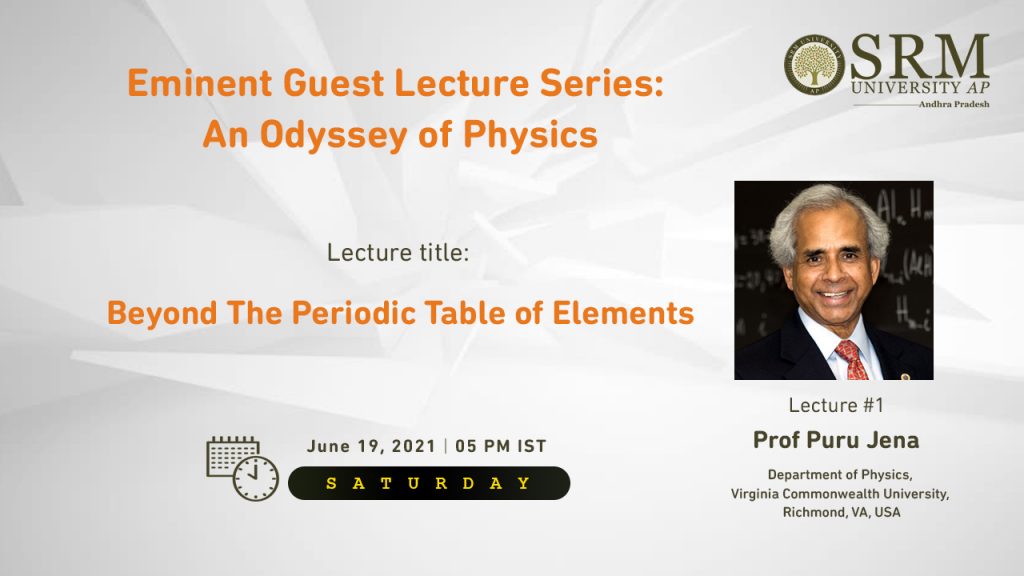 The Department of Physics, SRM University-AP, Andhra Pradesh, organizes a continual online and offline Lecture Series entitled “Eminent Guest Lecture Series: An Odyssey of Physics” to understand the recent advances and future developments in the field of Physics and allied sciences. The first seminar of this lecture series, on the theme Beyond the Periodic Table of Elements is scheduled to be held on June 19, 2021 at 5.00 pm (IST). Prof Puru Jena, distinguished Professor of Physics at Virginia Commonwealth University, USA will enlighten and engage the session with his extensive knowledge and expertise in the domain.
The Department of Physics, SRM University-AP, Andhra Pradesh, organizes a continual online and offline Lecture Series entitled “Eminent Guest Lecture Series: An Odyssey of Physics” to understand the recent advances and future developments in the field of Physics and allied sciences. The first seminar of this lecture series, on the theme Beyond the Periodic Table of Elements is scheduled to be held on June 19, 2021 at 5.00 pm (IST). Prof Puru Jena, distinguished Professor of Physics at Virginia Commonwealth University, USA will enlighten and engage the session with his extensive knowledge and expertise in the domain.Abstract: The periodic table created by Mendeleev in 1869 is the mother of all materials. The realization that the physics and chemistry of materials at the nanoscale can be very different from their bulk and that their properties in small clusters can be tailored one atom at a time led to the hypothesis, more than twenty years ago, that stable atomic clusters with specific size and composition and mimicking the chemistry of atoms can be designed and synthesized. These clusters, known as superatoms, can form the building blocks of a new three-dimensional periodic table as well as a new class of cluster-assembled materials. In this talk, Dr Puru Jena will outline the considerable progress that has been made over the years by focusing on superalkalis and superhalogens, which mimic the chemistry of alkalis and halogens, respectively and can be used to form supersalts with uncommon properties. The ionization energies of superalkalis are less than those of alkali atoms while the electron affinities of superhaloegns are larger than those of halogen atoms. He will present examples where these superions are used to promote unusual chemistry making noble gas atoms form chemical bonds at room temperature, superhalogens forming halogen-free electrolytes in Li-ion batteries, superalkalis as building blocks of new electrides where the electron is completely detached from the host and remain localized pretending to be an anion without a nucleus, superhalogens as building blocks of multiferroic materials, and supersalts capable of enhancing the Curie temperature of 2D materials. The synergy between first principles theory and experiments in advancing our understanding of matter at the nanoscale will be highlighted.
About the Speaker: Dr Puru Jena is a Distinguished Professor of Physics at Virginia Commonwealth University and received his Ph. D. in Physics from the University of California at Riverside. He also served as Program Director at the National Science Foundation and as Jefferson Science Fellow and Senior Science Advisor at the US Department of State. Dr Jena’s research covers a wide range of topics in Nano-structured Materials, Condensed Matter Physics, and Materials Science. These include structure and properties of metals, semiconductors, superconductors, alloys, liquid metals, point and complex defects, surfaces, thin films, atomic clusters, and cluster assembled materials. His current research is focused on three major areas: Structure and properties of nano-clusters and cluster assembled materials (0 D), nanotubes and nanowires (1D) and mono- and multi layered materials (2D) with emphasis on energy storage; electronic, magnetic, and optical properties. Dr Jena is the author of nearly 630 papers including 14 edited books with Google citations and H index at 31,300 and 88, respectively. He has given over 425 invited talks in international conferences and academic institutions in 29 countries around the world and has organized 50 international conferences. He has received over $15 million dollars of funding from federal agencies such as the Department of Energy, Department of Defense, National Science Foundation, and NASA. His many honours include being the Fellow of the American Physical Society; Outstanding Scientist of Virginia; Outstanding Faculty of Virginia; Presidential Medallion, University Award of Excellence, and Outstanding Scholar from Virginia Commonwealth University. He has served as a member of numerous scientific panels including on the Presidential Commission on bilateral scientific collaboration between USA and Russia.
We welcome you to actively participate in this scholarly lecture series on 19 June 2021 at 5.00 pm (IST). For more details and registration, kindly visit the links given below:
Registration Link: https://srmap.zoom.us/webinar/register/WN_MV36TDJ1Tw6MuuG7ep8BcA
Know more about Prof Jena: https://physics.vcu.edu/jenasgroup/
Continue reading → - Intriguing discussion on “Dietary Risk Factors for Non-Communicable Diseases (NCDs) and Dietary Management” May 24, 2021
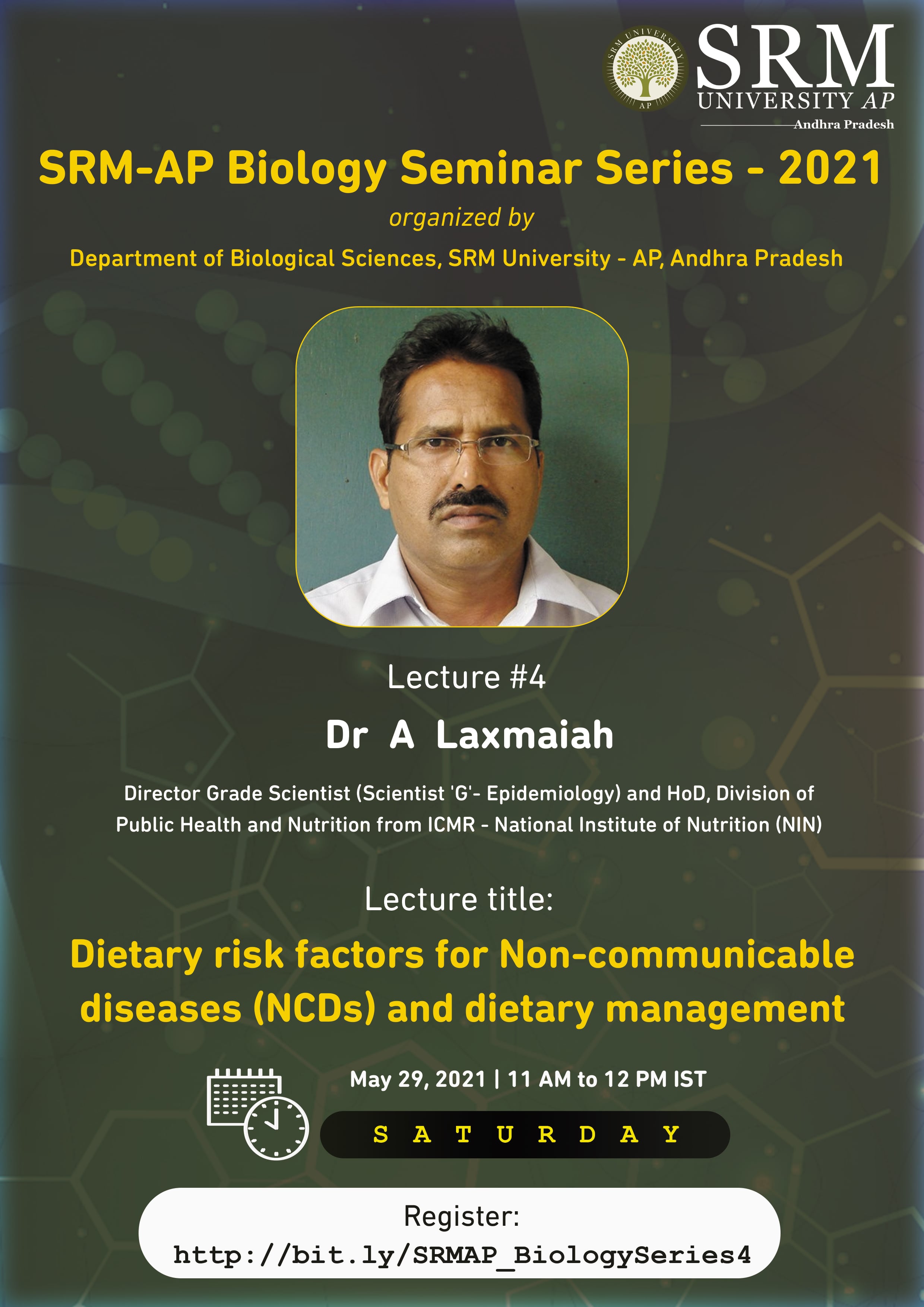 The fourth edition of the Biology Seminar Series presents an enthralling webinar on “Dietary Risk Factors for Non-Communicable Diseases (NCDs) and Dietary Management.” Dr A Laxmaiah, Director Grade Scientist (Scientist ‘G’- Epidemiology) and HoD, Division of Public Health and Nutrition from ICMR – National Institute of Nutrition (NIN), will grace the event as the keynote speaker. The webinar has been scheduled for May 29, 2021, at 11 am.
The fourth edition of the Biology Seminar Series presents an enthralling webinar on “Dietary Risk Factors for Non-Communicable Diseases (NCDs) and Dietary Management.” Dr A Laxmaiah, Director Grade Scientist (Scientist ‘G’- Epidemiology) and HoD, Division of Public Health and Nutrition from ICMR – National Institute of Nutrition (NIN), will grace the event as the keynote speaker. The webinar has been scheduled for May 29, 2021, at 11 am.Dr A Laxmaiah has an academic background in Medicine and Public Health, with hands-on professional experience in Public Health Nutrition at the National Institute of Nutrition (NIN), ICMR, Hyderabad. He is involved in many training & capacity building programmes in health and nutrition care. He has carried out several epidemiological, operational research and randomized clinical trials (RCT) in the field of Health and Nutrition. Dr A Laxmaiah further attended and presented numerous research papers in National and International Conferences, Seminars, workshops and meetings.
Dr A Laxmaiah has published more than 120 papers in National & International journals like The Lancet and BMJ. He is a subject Expert member in several health and nutrition committees of various Ministries like Department of Women and Child Development (MoWCD), Health & Family Welfare (MoHFW), National Disaster Management Authority (NDMA), Science and Technology (DST), HRD (MDM Programme), Government of India and in many National and International NGOs.
Dr A Laxmaiah graduated in medicine (MBBS) from Kakatiya Medical College, Warangal in 1987. After that, he obtained a Post Graduate Diploma in Public Health (DPH), Osmania Medical College, Hyderabad in 1992 and a Post Graduate Certificate in Applied Nutrition from National Institute of Nutrition, Hyderabad in 1994. Dr A Laxmaiah pursued Master Degree in Public Health (MPH) from Sree Chitra Tirunal Institute of Medicine Sciences and Technology, Thiruvanathapuram, Kerala and a Master in Business Management (MBA). Lastly, he was awarded a PhD in Public Health Nutrition by the NTR University of Health Sciences, Vijayawada in 2014. He has written many book chapters on health and Nutrition and received several national and international training in health and Nutrition.
Dr A Laxmaiah has been honoured with many awards and accolades. He has received the International training Fellowship Award in the year 2006 from the ‘International Union of Nutritional Sciences (IUNS), USA, to attend the African Nutrition Epidemiology Conference in August 2006, Ghana, South Africa. He was awarded INF/Kraft Fellowship for the training of “Institutional Research Capacity Strengthening in Nutrition” in September 2007 and also attended the 10th Asian Congress of Nutrition at Taipei, Taiwan. Dr A Laxmaiah received the Best Paper Award in the year 2008 for the paper “Pattern of indigenous vegetables and legumes consumption in rural India”, presented in the International Conference on Indigenous Vegetables and Legumes. Prospectus for Fighting Poverty, Hunger and Malnutrition, ICRISAT, Patancheru, Hyderabad. He was selected for the ‘International Health Professional of the year 2010’, awarded by the Research and Advisory Board, International Biographical Centre, Cambridge, UK. Dr A Laxmaiah also received a Postdoctoral Training Award from the Bristol University and London School of Hygiene and Public Health, UK., in 2012. He was further selected as an ‘Honorary Senior Research Fellow’ in the Faculty of Medicine at the Royal Imperial College, London, UK, in recognition of his contributions to the field of Nutrition and Health.
Join the webinar on May 29, 2021, at 11 am to avail yourself the opportunity to learn more on Dietary risk factors for Non-communicable diseases from the expert himself.
Register:http://bit.ly/SRMAP_BiologySeries4
Continue reading → - IIRS-ISRO offers “Online Certificate Course on Space Technology and Applications” May 20, 2021
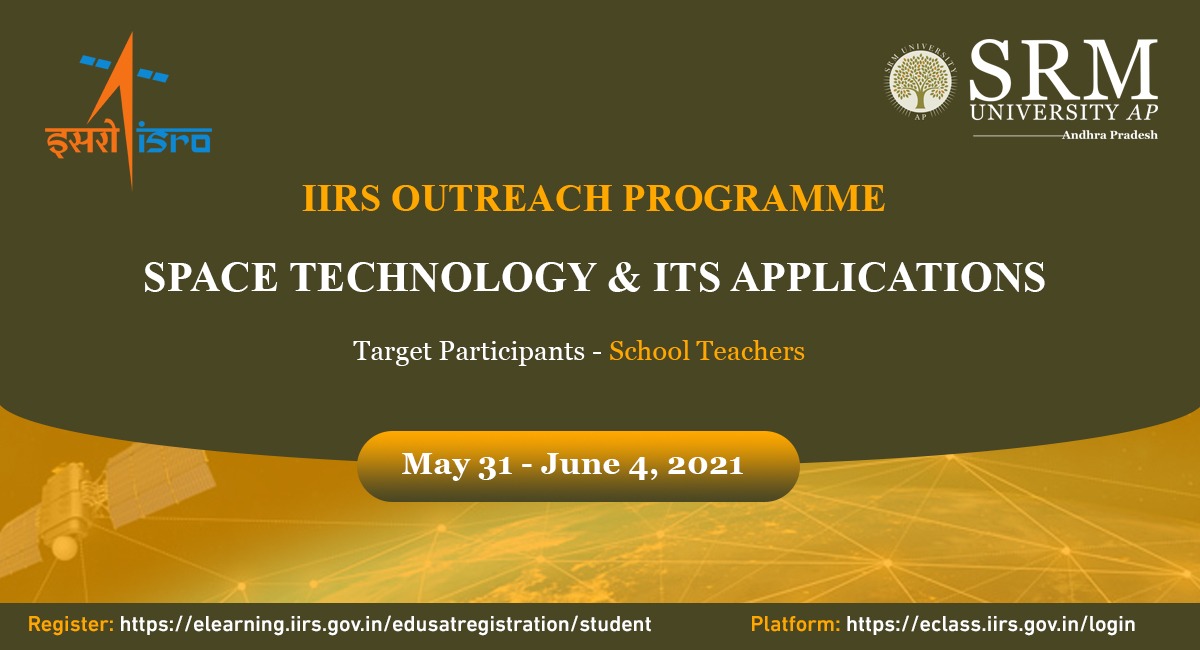 Indian Institute of Remote Sensing (IIRS) -Indian Space Research Organization(ISRO) is offering a five-day “Online Certificate Course on Space Technology and Applications” from May 31 to June 04, 2021. The course will be highly beneficial for the school teachers, who teach science, mathematics and geography. The Registration process is going on for the course. With a limited number of available seats, participants are encouraged to secure their enrolment as early as possible. The course intends to create awareness and capacity building of school teachers on the use of space technology and its application.
Indian Institute of Remote Sensing (IIRS) -Indian Space Research Organization(ISRO) is offering a five-day “Online Certificate Course on Space Technology and Applications” from May 31 to June 04, 2021. The course will be highly beneficial for the school teachers, who teach science, mathematics and geography. The Registration process is going on for the course. With a limited number of available seats, participants are encouraged to secure their enrolment as early as possible. The course intends to create awareness and capacity building of school teachers on the use of space technology and its application.IIRS outreach programme is an innovative distance learning initiative for training the students and professionals from academic Institutions and user departments in the field of geospatial technology & Earth Observation (EO) by utilising state-of-art Information and communication technologies. SRM University AP-Andhra Pradesh has collaborated with the Indian Institute of Remote Sensing (IIRS) -Indian Space Research Organization (ISRO) ‘s outreach programmes. As part of the association, SRM University-AP being the nodal centre for such programmes, the people of SRM University-AP have the excellent opportunity to register for courses as well as live and interactive programmes being organised by IIRS. In addition, E-learning courses for a short span of 3-4 Month duration will be accessible by the students.
Course Brochure: Know more about the course
Course Schedule: View the detailed course schedule
Registration Link: https://elearning.iirs.gov.in/edusatregistration/student
Platform where course is held: https://eclass.iirs.gov.in/login
Continue reading → - “Films as History; Exploring Historiophoty”-a discussion on defining the relations between Films and History. May 17, 2021
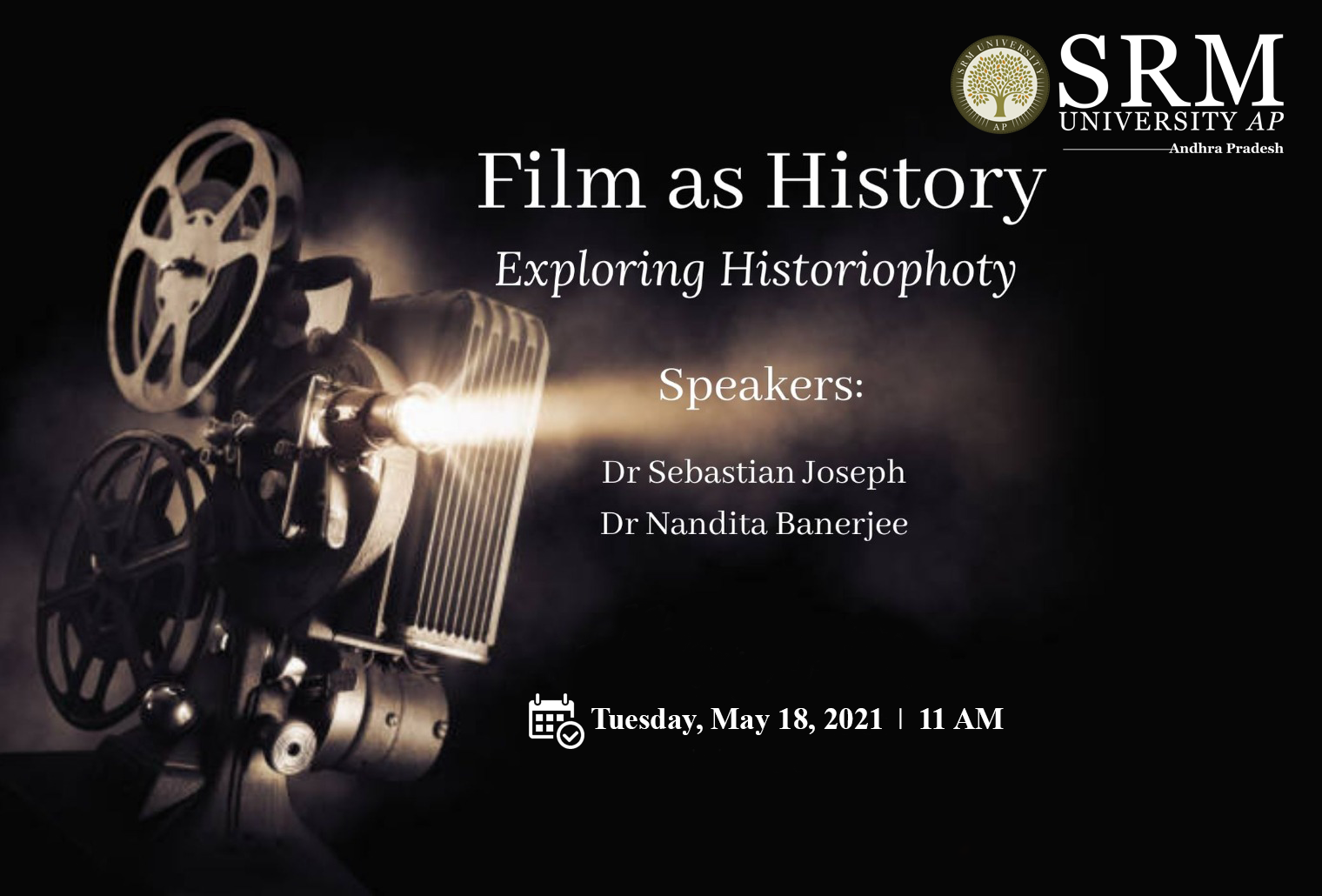 The Department of History, SRM University-AP, initiates a monthly webinar series with a thought-provoking discussion on defining the relations between Films and History. “Films as History; Exploring Historiophoty”, the introductory session of the series, has been scheduled for Tuesday, May 18, 2021, at 11 am.
The Department of History, SRM University-AP, initiates a monthly webinar series with a thought-provoking discussion on defining the relations between Films and History. “Films as History; Exploring Historiophoty”, the introductory session of the series, has been scheduled for Tuesday, May 18, 2021, at 11 am.Dr Sebastian Joseph, a Historian and Film Critic, will deliver the first talk of the webinar. Dr Joseph was the State Award Winner for Best work on Film History 2020. He has authored Cochin Forests and the British Techno-ecological Imperialism in India.
Dr Nandita Banerjee will be the keynote speaker in the second session of the webinar. She is an Associate Professor at Sindhu Kanho Birsa University and a pioneer in Film History and Visual Studies in History.
The webinar aims to discuss the use of films in particular and visual images in general as sources for the reconstruction of History. It will deal with the promises and challenges of Historiophoty as a sub-stream of history. Following Hayden White’s pathbreaking analysis of visual imagery and its location in historiography, Historiophoty has emerged as a most promising pathway for historians, particularly as we move towards a rapidly digitizing world. The webinar series will introduce students to new and exploratory themes in History.
Join the Webinar Here: https://srmap.zoom.us/j/96304703524?pwd=VVRBY3VLRDdsbEVGTDBBdnY0T2RrQT09
Continue reading →
Meeting ID: 963 0470 3524
Passcode: 803909 - Prof Arunan to usher into the advancement of Molecular Beam Microwave Spectroscopy May 6, 2021
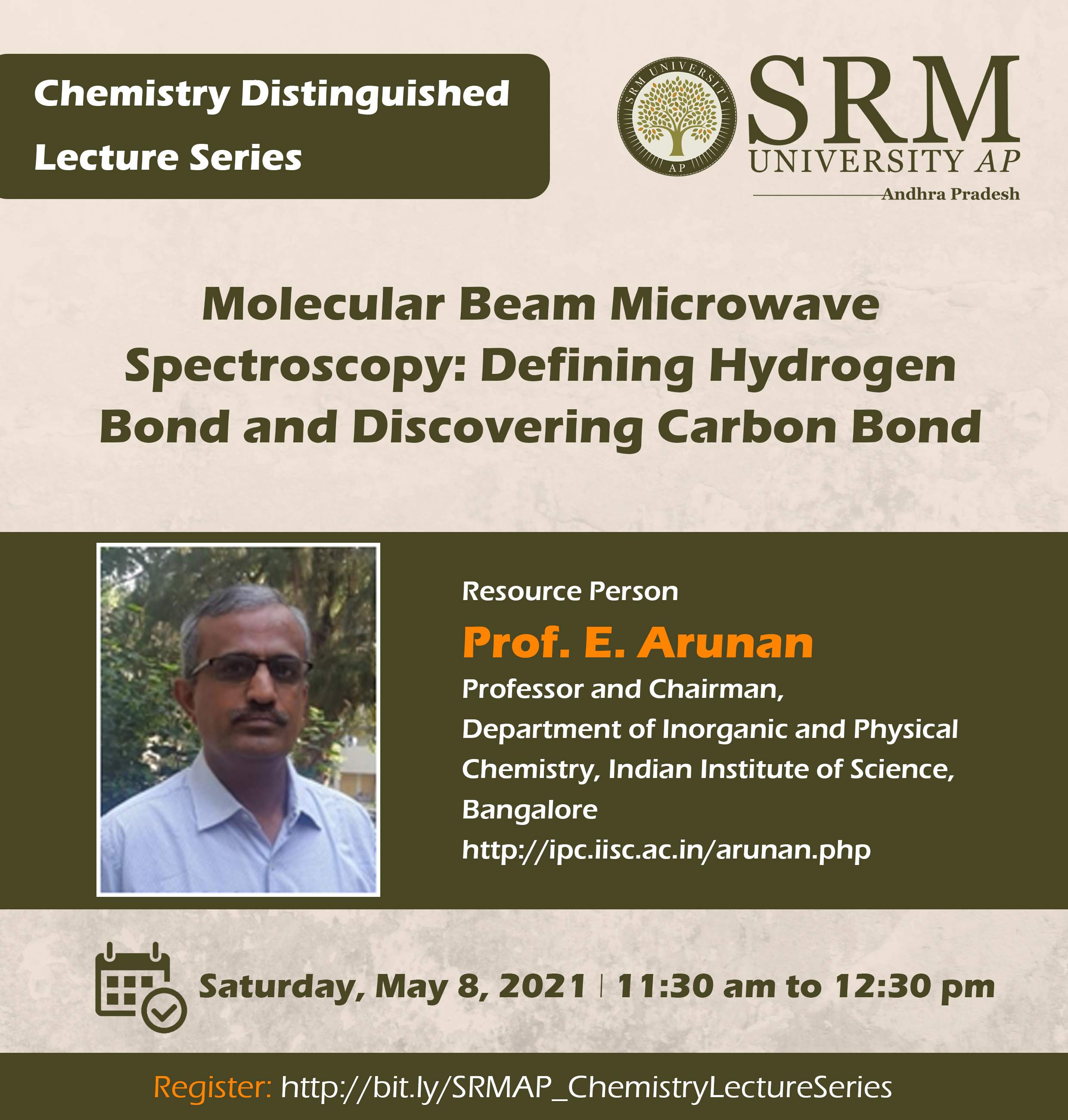 The Chemistry Distinguished Lectures series starts its voyage towards transcendental knowledge with an exciting discussion on “Molecular Beam Microwave Spectroscopy: Defining Hydrogen Bond and Discovering Carbon Bond” on May 8, 2021, at 11.30 am. Renowned scientist and Professor E Arunan from the Department of Inorganic and Physical Chemistry, Indian Institute of Science (IISc), Bangalore, will join the webinar as the Keynote Speaker.
The Chemistry Distinguished Lectures series starts its voyage towards transcendental knowledge with an exciting discussion on “Molecular Beam Microwave Spectroscopy: Defining Hydrogen Bond and Discovering Carbon Bond” on May 8, 2021, at 11.30 am. Renowned scientist and Professor E Arunan from the Department of Inorganic and Physical Chemistry, Indian Institute of Science (IISc), Bangalore, will join the webinar as the Keynote Speaker.Professor Arunan has extensive research experience in the field of Chemical Sciences and is long associated with IISc, Bangalore, one of the premier institutes of India. Dr Arunan pursued his undergraduate studies at The American College, Madurai, followed by two masters from IIT Madras and IIT Delhi. He obtained his doctoral degree from Kansas State University, USA. Prior to becoming an academician, he worked as a Post-Doctoral Scholar at the University of Illinois at Urbana-Champaign. Prof Arunan started his career as an Assistant Professor at the Department of Chemistry, IIT-Kanpur in 1995. He later moved to the Department of Inorganic and Physical Chemistry, IISc, Bangalore and became a Professor in 2009 and Chairman in 2018.
Prof Arunan’s research interests include experimental physical chemistry, molecular and van der Waals spectroscopy, chemical kinetics and dynamics, hydrogen bonding and other intermolecular bonds/interactions, shock wave interactions with molecules and materials, astrophysics/astrochemistry. He has published around 100 papers in peer-reviewed international Journals, 14 in International Conference Proceedings, 8 in Resonance, the Journal of Education and 16 in Current Science, published by the Indian Academy of Sciences. The celebrated personality has given numerous plenary, keynote and invited lectures all over India and many countries in the world, including the USA, UK, France, Germany, Italy, Poland, Spain, Portugal, Hungary, Finland, Russia, Australia, Czech Republic, China, Pakistan, Bangladesh, Singapore and South Korea. He has delivered inspiring talks at most of the premier institutes in India and also in colleges and high schools all over India.
Prof Arunan is a Fellow of International Union of Pure and Applied Chemistry, Indian Academy of Sciences and a member of the International Advisory Board for ‘Horizons in Hydrogen Bond Research” Conference 2011, International Advisory Board for the Asian Spectroscopy Conference 2009-2013, Programme Advisory Committee on Physical Chemistry, Department of Science and Technology 2008-2012, International Advisory Editorial Board for Physical Chemistry Chemical Physics, Royal Society Publication, From 2005 and many other organisations and advisory boards. Further, he is serving the scientific community as the Section Editor (Chemistry) for Current Science from 2018, Associate Editor from 2013, Associate Editor for Journal of Chemical Sciences from 2012-2016.
Prof Arunan’s contributions to the world of Chemical Sciences has been acknowledged with many awards and accolades. He was the recipient of the Chemical Research Society of India Bronze Medal 2008. He is also the Founder Member cum Vice-President of the Indian Society for Shockwave Research.
Chemistry enthusiasts are encouraged to join the webinar to learn more on the Molecular Beam Microwave Spectroscopy from the expert himself on May 8, 2021, at 11.30 am.
Register: http://bit.ly/SRMAP_ChemistryLectureSeries
Continue reading →

